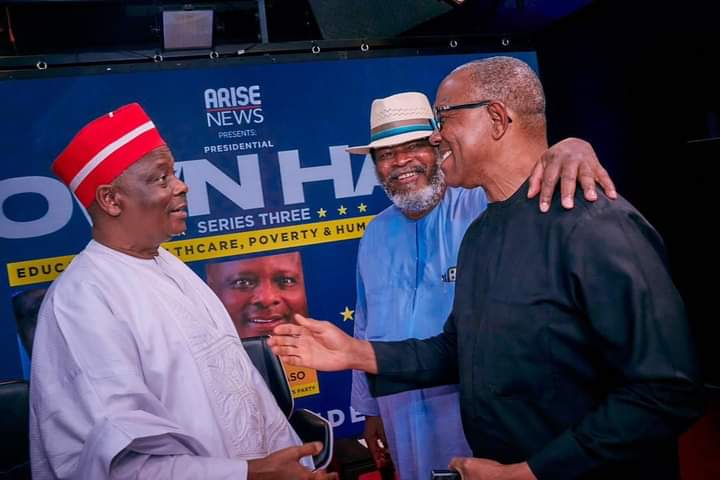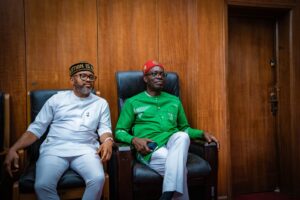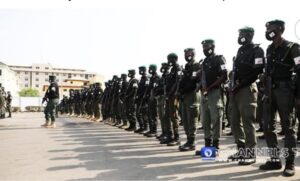
Should Labour Party’s Peter Obi or New Nigeria Peoples Party’s Rabiu Kwankwaso win the presidency in 2023, the former Kano governor, with a far saner crowd around him and a secular habit that enables him to avoid cultivating and politicising religion, would govern far better than the former Anambra governor. But neither Mr Obi nor Mr Kwankwaso can win, whether they publicly acknowledge it or not, and regardless of the endorsements they have received from influential members of the Nigerian power elite. It is, therefore, not surprising that rumours of their stepping down in favour of the big parties persist, especially because both seem at their wit’s end in raising the requisite funds needed to structure and run their previously orphaned but adopted political parties. With paucity of funds and dearth of experienced politicians to help manage their ambitions, both men may begin thinking the unthinkable as weeks chase weeks in January, probably the last month in which votes can be safely locked down.
Last week in Abeokuta, Mr Kwankwaso was asked whether he was considering stepping down for any of the big parties. He dismissed the idea, suggesting quizzically that the time to concede the race and step down for anybody was gone. The NNPP, he said, was presenting candidates for the various races, and it would be inappropriate to abandon them. He was not confident they could win, but he was assertive about the morality of not negotiating away the ambitions of his protégés. He said little about himself; and since his mind was not legible, it was difficult to estimate what pains he was enduring running a race he must know at the bottom of his heart he stands no chance of winning. He is a more realistic man, a sound administrator, a passable secularist, and a believer in Nigeria. If anyone between him and Mr Obi was likely to step down, it would have to be him. He could step down, but it is not clear whether he would.
Unlike Mr Kwankwaso, Mr Obi is tethered to his followers by an implacable bond of social, political and religious fanaticism never before experienced in these parts. He was running mate to Atiku Abubakar, ex-vice president and two-time PDP presidential candidate, in the last presidential poll, and is also dogged by rumours that he could step down for his former boss. So far in the race, he has not attacked Alhaji Atiku, not even in whispers, not even in his bedroom, and perhaps not even in his dreams. He is proud to announce that he would not say a word against the PDP candidate. In theory he could step down, obviously for Alhaji Atiku, but he has become a hostage to his followers, and by his excursions to churches to curry admiration and support, he has also become a hostage to himself. Every trip to a church has been met by vibrant approbation and such robustious din no church of Jesus Christ was ever thought to have the leeway to render to any politician. Yes, he could step down, especially because his party is presenting fewer candidates than the NNPP for the next set of polls, but he will be more loth than Mr Kwankwaso to abandon the race without consequence to himself or his political future.
But the rumours will persist and will reach a crescendo in January, weeks before the fateful presidential election. If it became clear to the candidates of the All Progressives Congress (APC) and the PDP that the election would be too close to call, they would intensify the jostle and put inordinate pressures on the two fringe and disruptive candidates of the LP and NNPP. However, if one of the two fringe candidates should step down, the other may follow suit. They are not political Siamese twins, it is obvious, and in methods and ideology, both are absolutely dissimilar. Mr Kwankwaso is ideological, a progressive even, and he considers stretching stories or events beneath him. Mr Obi is a free spirit flattered by the hosannas he has been receiving from churches. He will do anything for votes and approbation. In sum, both fringe players are bound together by a common fate, condemned as they are to bring up the rear in the February race.
Despite the cheap political antics of the former House of Representatives Speaker, Yakubu Dogara, and the former Secretary to the Government of the Federation (SGF), Babachir David Lawal, who both deployed sectarian tactics to drive hard bargains into political whoredom, the February presidential poll may not be as entangled as it appears at first view. There are suggestions that more than Mr Kwankwaso, the LP candidate may complicate the race, hacking significant votes from the geographical portion originally ceded to Alhaji Atiku in the Southeast and perhaps a part of the South-South. But with the politics of rotational presidency, it is not clear that this supposition is irrefutable. All that is known, however, is that Mr Obi, sometimes dubbed Saint Obi for assiduously, indecently and desperately currying the Christian votes for his presidential bid, will self-destruct should he step down for Alhaji Atiku. After all, he seems the more likely of the two fringe candidates to concede the race before the ballots are cast. He is the least ideological, does in fact not believe in ideologies, nor does he think anything of manifestos. Though he has finally produced a manifesto, it is a largely platitudinous document he will never speak to or engage even in his nighttime cogitations. Like the PDP manifesto which Alhaji Atiku has orphaned and will not speak to, the LP manifesto is simply produced to silence those who scorned Mr Obi for his speciousness.
The LP candidate has rekindled hope among the Igbo that they could produce a man whose politics would resonate nationally, notwithstanding the fact that the impression he creates may be superficial, deriving oxygen to play his brand of politics by dint of the APC’s Muslim-Muslim ticket. It has enabled Mr Obi to cast himself in the mould of a Christian candidate, the darling of the politicised Pentecostal bishops and Christian faction of the power elite. Years ago, Labour and Employment minister Chris Ngige, a medical practitioner, was thought to possess the charisma which, encouraged and sculpted appropriately, could help sell his presidential aspiration as a south-easterner to the rest of the country. But his tenure as a minister has exposed his delusional side. Indeed, last April he imagined himself as having done what Napoleon Bonaparte could not do in fostering conciliation between the federal government and university teachers’ union, ASUU. Yet, he is also curiously capable of self-abnegation, when he described President Muhammadu Buhari as having done with education what Napoleon (yes, the same Napoleon) could not do. It finally dawned on his interlocutors in the ASUU-FG imbroglio that apart from his fixation with Napoleon, Dr Ngige suffered from delusion of grandeur. Had they known this side of him, instead of staring him down, ASUU would have massaged his ego to get what they wanted.
The Igbo also have an alternative in the current Anambra governor, Charles Soludo. But it will take time to gauge his mettle and determine whether he can establish and build the kind of network and bridges needed for a south-easterner to successfully aspire to be president. Mr Obi wishes to use the Christian ladder to pole vault into the presidency. The problem is that the pole he is using is not made of fiberglass; it is made of dry wood. It will not only break when he leans on it during his sprint to February, it is also brittle to the touch. Whether he goes ahead to contest or not, Mr Obi is unlikely to meet with success. Should he contest, he will fail, and by the next election cycle will be supplanted by more solid Igbo aspirants. Should he step down, he will have signed his political death warrant, for the yokels who egg him on with fanatical glee are not the kind of fellows to take no for an answer, and will not take lightly being taken for a foolish and useless ride.
On the other hand, Mr Kwankwaso, 66, can safely step down and still keep his relevance. He occupies a safe zone in northern politics that is hard to fill, a zone dedicated to political pragmatism and, in some ways, ideological progressivism, a zone famished for someone like him, a man of steel and character. And if he declines to step down, he will still retain his relevance far beyond 2023, even if he never contests again. He is obviously not as flighty as the LP candidate, and has not deployed his defection proclivity in the same casual and sentimental fashion Mr Obi throws caviar to the general in traipsing from party to party and from church to church. In theory, both the LP and NNPP candidates could step down, but it will not be until sometime in late January before Nigeria finds out whether any of them would. And of course that would also depend on how bitter the taste of anticipated defeat feels in their mouths.
It is sometimes difficult to decipher ex-president Goodluck Jonathan’s very fluid politics, as a new book by Nathaniel Bivan appears to indicate. Dedicated to showcasing the chaplaincy of Obioma Onwuzurumba under the Jonathan presidency, the book presented in Abuja last week reveals another curious side of the former president, a side completely at variance with his private expectations of himself as a politician and leader. Dr Jonathan’s views are of course not as sanctimonious as those of another former president Olusegun Obasanjo, no, not at all, for that would defame the character he had carefully woven for himself for years; nor as evasive as those of former military head of state Ibrahim Babangida. But overall, his views are infinitely more difficult to place. As president, Chief Obasanjo had a direct line to heaven, he said; perhaps he still does, and his interpretation of faith at the time was that he only needed to wish a thing, and heaven was at his beck and call. Frail and less meddlesome now, he is probably not as cocksure today. Gen. Babangida on the other hand did not boast of any celestial connections, nor the gifts of a proselyte; but his seeming self-doubt masked an assertive determination to play God or subvert Him in the affairs of men. Dr Jonathan is entirely different. Diffident but more ruminative, he ruled as though he dared not, and courted heaven’s endorsement as if, even as a Christian, he was an outsider.
Mr Bivan, the author of the book on Mr Onwuzurumba, ‘My Time As Chaplain In Aso Rock,” contains a brilliant and revelatory interview with Dr Jonathan. The media feasted on two areas of the interview last week: the former president’s opinion on insinuations that he attempted to contest the presidential primary for the 2023 poll; and his take on APC’s Muslim-Muslim ticket. Both perspectives, as the interview revealed, took equivocations to new limits. On his attempt to contest the 2023 APC presidential primary, he said: “I was enjoying the drama. At least they were not insulting me. After all, I was pursued out of the office, that I was not good enough. So, if now, Nigerians are saying, ‘Oh, this man should come,’ that means they are cleaning me up. So, let me enjoy the drama…I was not disturbed. I know I cannot go and start struggling to be President again. It wasn’t only Nigerians who were asking me such questions, even most of the top ambassadors – the American ambassador, the UK High Commissioner, France, and all of them. They came to ask me whether I would contest. I don’t think I would contest any election…If you wake up tomorrow and see that I’m President again, that means there may have been circumstances beyond my control. But not to go and pick one form and go and start lobbying people and running for campaigns, be it PDP power or APC broom and moving across Nigeria. I can’t do that again; if I do that, I will diminish myself.”
There is nothing in his response to indicate he did not try to contest the presidency – not his enjoyment of the drama from which he feigned aloofness, nor did he reveal the answers he gave the ambassadors who sought clarifications. He seemed to bask in the illusion that his drafters were cleaning up his image. How he came to this conclusion is hard to say, for he went on to suggest in another breath that attempting to contest again would diminish him. But the back and forth did not end there. In the interview, and probably remembering how inexpertly he disguised his true feelings at the tantalising prospect of being returned to an office he was loth to vacate, he did not quite discount the possibility of becoming president due to ‘circumstances beyond his control’. All he detested was the flagrant and messy aspects of the processes of vying for the presidency. In the end, no one obliged him, despite the atrocious sum paid by herders to buy the N100m APC presidential nomination form on his behalf. He probably forgot that when he was waffling and pussyfooting over the race months ago, the country was entertained to a daily blow-by-blow account of his conspiratorial manoeuvers, moves so replete with breathtaking suspense that the best playwright would have had difficulties in conjuring.
His views on the Muslim-Muslim ticket do considerable damage to the reputation he had tried so valiantly as a former president to cultivate and safeguard. Here is what he was quoted in the book as saying: “When I took over as the vice president, the tradition then was that if the president was a Christian, the vice would be a Muslim, and vice versa. We have religious festivals in Nigeria and, of course, National Day, where there will be Jumu’ah prayers and Christian prayers. Nigerians are religious people; this is why I get worried about the issues of Muslim-Muslim or Christian-Christian ticket. Yes, Muslim-Muslim or Christian-Christian can run the state. But I always ask, ‘who will represent this other bloc whenever we come to the national days that we celebrate?” Here, in the name of God, is the considered opinion of Nigeria’s former president. He has boiled everything down to which elected official in Aso Villa represents Christians or Muslims during festivities and holidays, since Nigerians are religious. In all his studies of great societies and empires, the only takeaway that seems to strike him is who represents whom on religious days, the same suffocating emptiness and drudgery addling the wits of every Dick and Harry. He forgets he was president, regardless of whether he deserved it or not, and that a perspective more elevating, inspiring and noble is expected of him.
Dr Jonathan’s vote next year would probably be cast not for vision or competence or the drive of the candidate but on whether the presidential ticket accords with the arithmetic and ecclesiastical balance of his acquired fancies. He bemoans the dismissal of his presidency; but years out of office, he has still not learnt any lessons. He will continue to reinforce his primordial understanding of politics in casting his ballot for a candidate that accords to his faith. After all, his loyalty to his party has been so tenuous and tentative that it is not even clear to himself that he was ever a PDP president. He was ‘pursued out of the office, that I was not good enough’, he whined. Why then would he care anything about loyalties beyond his boyish fancies? Dr Jonathan illustrates why Nigeria is teetering on the brink despite its enormous endowments. The country has never truly produced a deep, reflective and competent national leader. Worse, the country now boasts of power influencers shamefully ignorant of the terrible consequences of using religion and tribe to pick Nigeria’s president.
FOR ADVERT, POLITICAL CAMPAIGN ONLINE BANNER & POSTER DISPLAY, EVENT COVERAGE, SPONSORED ARTICLE/STORY PUBLICATION, PR AND OTHER MEDIA SERVICES:
PLEASE, SEND AN EMAIL TO : citizennewsng@gmail.com












